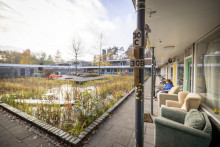Campus resident Tzora Tacx is currently collecting signatures from other residents to share all concerns by email to the housing association. The counter stood at 280 signatures within a day. These concerns, she says, are in the areas of privacy, the workability of the system, the communication of the housing provider and the procedure followed in recent months.
What exactly is going on? Two weeks ago, housing association Veste Wonen announced that it wanted to switch to a digital locking system for the campus homes, instead of the physical keys. The current key system is outdated and needs to be replaced, according to the housing provider. Students can then unlock the lock via their own Veste Wonen app on their phone. A demonstration of that new system took place last week, during the 'Veste Wonen Winter Event'.
Pragmatic and privacy concerns
During that event, criticism flared up among the campus residents. For example, there were pragmatic concerns about what to do when your phone's battery is empty. Or if you don't want to have a phone with you – whether or not for principal reasons? Or what if you can't get into your house after a night out? But other questions were also buzzing around: how safe is the use of this technology, for example?
'My biggest concerns are about the risks related to privacy,' says Tacx. ‘One of the representatives clearly stated during the Winter Event that data is being collected about which device opens the door and when that happens. Veste Wonen also needs different data, because you have to register.'
Same technology as banking sector
Warner Thijssen, strategic advisor services and innovation at Veste Wonen, says that the housing association itself does not collect data from the lock system. 'We already have the data we use based on the rental contracts drawn up. So we don't need any additional data. Since the beginning, we have been observing the GDPR legislation. The company that processes the data does so in a way that is equal to the ISO standards.' Data is primarily collected with a view to possible incidents, says Thijssen. 'Suppose there is a burglary without traces, then you always know which device a house was opened with. But only if you report it to the police and a protocol comes into effect.'
Thijssen also wants to reassure residents in terms of technology. 'It's a battery-free black button that sits under a door handle. You hold your phone against it, so that they make contact with each other via near-field communication. You can open the door within two and a half seconds. The chips in the door are manufactured in the Netherlands and every interaction is unique and fully secured. It is exactly the same technique as is used in the banking sector.'
And those worries about phones with empty batteries? 'We are installing five charging points on campus, just in case. We are the seventh housing provider in the Netherlands to introduce this system and the experience of others has shown that there are hardly any problems in practice,' says Thijssen. 'If someone really has a totally unsuitable phone, we have an alternative available. But that is really in cases of high exception.'
CBR does not support decision
Apart from the technology and the questions about privacy, Tacx accuses Veste Wonen of poor communication. And that the procedure followed is incorrect. 'This was communicated suddenly, in a very short period of time. In addition, I have obtained information from the Legal Desk. It seems that this is a renovation. In that case, Veste Wonen must send a renovation plan to the residents, which did not happen. Apart from that, I am of the opinion that the Central Residents' Council was not given sufficient space to fulfil its task.'
This image is confirmed by Michiel Campagne, a board member of the Central Residents' Council (CBR). 'The idea was already discussed in January during our regular meetings with Veste Wonen. Part of those meetings is that we are bound by a non-disclosure agreement; we are not allowed to go public with what is being discussed.'
According to Campagne, the Central Residents' Council invariably expressed the same concerns about privacy, technology and user-friendliness. 'After the summer holidays, things suddenly came up at lightning speed. It felt like the decision was made behind us. Yes, we are certainly a serious discussion partner, but the decision was made by Veste Wonen. That became clear to us. We therefore do not support this decision.'
2200 key transactions
According to Thijssen, Veste Wonen consciously chose this moment of communication. 'There is no formal non-disclosure agreement with the CBR. We wanted to stay in control and launch the app in one go. That is why we asked to keep this behind closed doors and the CBR could not inform people about this in advance. If you just throw information into the world without the entire context, things take on a life of their own. I understand that the CBR did not give their blessing and rightly noted that we would be facing resistance. We are noticing that right now. But such a process never goes smoothly, no matter how you do it.'
But why is it actually necessary for the locks to be replaced? 'As an organisation, we want to work as efficiently as possible,' says Thijssen. 'Every year we have 1100 departing and 1100 new residents. That is 2200 key mutations. We can now automate that. This way we are less concerned with administration and key management and we have more time for real attention towards residents.'
In addition to this efficiency improvement, Thijssen says it is also about improving services. ‘With the new digital locking system, as a tenant you can be sure that you are the only one who has access to your living space. And within the same app, you can not only open your home, but you get updates on planned maintenance, you can report damage, you name it.' Thijssen also points to other advantages. 'You can designate so-called keyfriends who can enter your home. We also work with keyfriend neighbours. Those who want to can create a profile, so that you can immediately get to know your six immediate neighbours better. This may be less relevant for a shared residential complex on the Witbreuksweg, but for someone living alone in a studio it can give a kickstart to make social contacts. Hopefully it will help to combat isolation and loneliness among students.'
'Cooperation and reasonableness'
What next? The intention is that the locks will be replaced from 3 February. Before the summer, all 2400 campus homes must have the new system. If it is up to campus resident Tacx, the project will ideally be completely abandoned. 'Or in a way that does not cause any inconvenience or concerns about privacy. But I don't think that's possible. In addition, I have not yet seen any response from Veste Wonen to the questions asked during the Winter Event.' Campagne hopes that Veste Wonen is open to the criticism and concerns of residents. 'That they go back to the drawing board on the basis of that. Or first carry out a pilot and then evaluate it critically, with input from residents.'
And the housing provider himself? 'It is absolutely not a renovation, but a replacement of a part,' says Thijssen. 'We are going to replace an outdated lock, which takes three minutes. That's it. Every change creates resistance. We will come up with answers to the questions at the Winter Event as soon as possible and there is an extensive FAQ in the app. We would like to explain everything and try to take away the concerns as much as possible in the coming period. In any case, I hope for cooperation – and reasonableness.'







